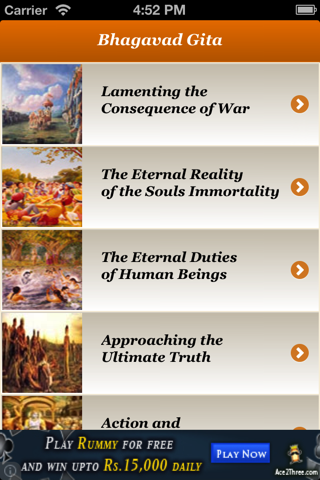
Bhagavad Gita Tamil app for iPhone and iPad
Developer: Nua Trans Media
First release : 14 Feb 2014
App size: 17.96 Mb
A sacred Hindu text that is incorporated into the Mahabharata and takes the form of a philosophical dialogue in which Krishna instructs the prince Arjuna in ethical matters and the nature of God.
The Bhagavad Gita, The Song of the Bhagavan, often referred to as simply the Gita, is a 700-verse scripture that is part of the Hindu epic Mahabharata.
The Gita is set in a narrative framework of a dialogue between Pandava prince Arjuna and his guide Lord Krishna. Facing the duty to kill his relatives, Arjuna is "exhorted by his charioteer, among others, to stop hesitating and fulfill his Ksatriya (warrior) duty as a warrior and kill." in this appeal to ksatriyadharma (heroism) is "a dialogue between diverging attitudes concerning and methods toward the attainment of liberation (moksha).
The Bhagavad Gita presents a synthesis of the Brahmanical concept of Dharma, theistic bhakti, the yogic ideals of liberation through jnana and Samkhya philosophy.
Numerous commentaries have been written on the Bhagavad Gita with widely differing views on the essentials. Vedanta commentators read varying relations between Self en Brahman in the text, while the setting of the Gita in a battlefield has been interpreted as an allegory for the ethical and moral struggles of the human life.
App Feature
- Audio Play
- Internet required
- iOS 7 compatible



